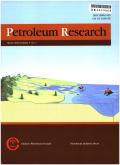Waxy crude oil is known for its high wax contents that can potentially result in gelling following sufficient cooling of the transportation line in the subsea bed at offshore fields. The gelling over the entire lines requires an accurately predicted restart pressure to restart the clogged and idle system. However, the common way of predicting the restart pressure has been reported to result in over-designed and predicted piping parameters. Recent research findings evidenced the formation of voids which would reduce the restart pressure significantly. The study conducted in this paper is aimed at investigating the voids size distribution in gelled crude oil across and along transportation pipelines. Sets of experiments simulating crude oil transportation during both static and dynamic cooling were conducted. The gelled crude oil below the pour point temperature was then scanned using a Magnetic Resonance Imaging (MRI) system to detect the voids formed. The resulting voids at each scanning cross-section were quantified, and their distributions were investigated. It was observed that dynamic cooling had minimal impacts on the voids size difference along the pipeline with the difference in voids areas within 10 mm2 to be twice and uniform for the entire flow rates tested. However, voids size in statically cooled waxy crude oil was found to be highly distributed with a maximum of 6 voids size distribution in 10 mm2 ranges. The low-end temperature had the highest size difference while the difference was decreasing with higher end temperatures. This study shows that the voids amount in dynamically cooled waxy crude oil could also be estimated with lower numbers of cross-sectional voids areas. However, the higher cross-sectional voids detection is recommended while estimating voids in statically cooled waxy crude oil.


